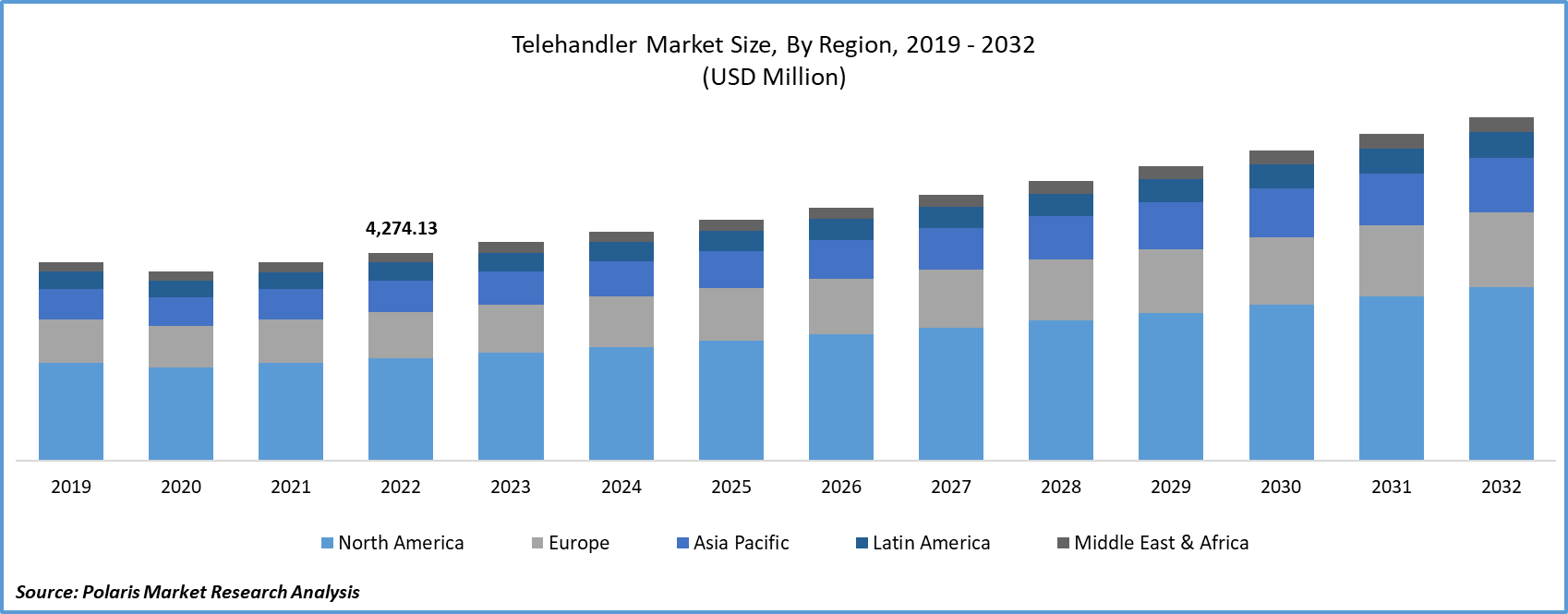
Telehandler Market Share, Size, Trends, Industry Analysis Report, By Product (Large, Compact), By Propulsion Type (ICE, Electric), By Lift Capacity, By End-use, By Region, And Segment Forecasts, 2024 - 2032
- Published Date:Jan-2024
- Pages: 118
- Format: PDF
- Report ID: PM3918
- Base Year: 2023
- Historical Data: 2019-2022
Report Outlook
The global telehandler market size and share was valued at USD 4486.13 million in 2023 and is expected to grow at a CAGR of 5.20% during the forecast period.
The market has seen significant expansion, driven largely by the thriving construction sector, particularly in emerging economies. Urbanization has played a pivotal role in driving up construction activities, encompassing residential complexes, commercial structures, and infrastructure projects. With cities growing and populations surging, there is a heightened need for modern, well-equipped buildings. Additionally, large-scale infrastructure endeavors like highways, bridges, airports, and rail networks necessitate versatile equipment that can efficiently handle diverse tasks.
The market research report offers an in-depth analysis of the industry to support informed decision-making. It offers a meticulous breakdown of various market niches and keeps readers updated on the latest industry developments. Along with tracking the Telehandler Market on the basis of SWOT and Porter’s Five Forces models, the research report includes graphs, tables, charts, and other pictorial representations to help readers understand the key insights and important data easily.
A telehandler, or telescopic handler, is a versatile hydraulic unit used to lift, move, and place material. It comes equipped with a telescopic boom and lifting attachment and can function as a forklift and as a crane. Also, a telehandler can be fitted with a wide range of attachments that allow it to perform a variety of functions. The unit functions by exchanging signals between a computer and weight sensors throughout the device. It uses a number of features, such as steering options, boom flexibility, load stabilizers, and frame leveling, to determine which movements for the machine are safe.
There are several benefits of using telehandlers made by telehandler market key players. Depending on the task to be performed, operators can attach different attachments to the machine. Also, as telehandlers can leverage weight on all surfaces, they can be used on any terrain without the addition of extra safety protocols. Furthermore, these machines offer a full range of motion and can move seamlessly in confined spaces and around obstacles. Telehandlers have a wide range of applications in several industries, including manufacturing, construction, and agriculture.
The telehandler market report is a comprehensive assessment of all the opportunities and challenges in the industry. It covers all the recent innovations and major events in the industry while shedding light on the key market features such as CAGR, supply/demand, cost, production rate and consumption. Along with that, the study offers a thorough analysis of the key market dynamics and latest trends to help businesses develop strategies that will drive telehandler industry growth.

To Understand More About this Research: Request a Free Sample Report
Furthermore, these machines provide versatility in demanding landscapes, enabling construction projects to advance seamlessly even in rough or limited spaces. The requirement for telehandlers stems from the construction industry's desire for efficient and secure material handling, enhanced productivity, and adaptability in different on-site situations. This ultimately leads to more efficient construction procedures and successful project results.
The agricultural industry is presently undergoing a significant revolution propelled by swift technological progress and an increasing need for enhanced productivity. This has led to the adoption of cutting-edge approaches and precision farming methods. Farmers worldwide are enthusiastically incorporating mechanized solutions to fine-tune their processes and achieve the highest possible yield. Telehandlers empower farmers to efficiently perform tasks that were once laborious, such as loading and unloading, material handling, stacking and storage, and other demanding activities, all with remarkable ease and speed.
The capacity to lift and swiftly transport heavy hay bales or bulky materials not only saves valuable time but also reduces the need for manual labor. Additionally, telehandlers bring substantial cost savings to farmers by streamlining and automating various agricultural processes like crop management palletizing, and storage. These machines decrease the necessity for additional labor, resulting in lower labor costs. Farmers can allocate their resources more efficiently, optimizing their budgets while achieving higher productivity.

In this market, there is a high degree of fragmentation, with numerous manufacturers operating globally. This scenario fosters intense competition, leading to frequent price battles and increasing pressures on profit margins. Well-established market players continuously face challenges from emerging regional competitors who offer cost-effective solutions, further intensifying the competitive landscape. Consequently, this fierce competition often results in reduced profit margins and limited opportunities for expanding market share.
Industry Dynamics
Market Growth Drivers
Technological Advancements
The telehandler sector is currently witnessing a remarkable upswing in technological progress, which is augmenting their capabilities and improving operational efficiency. Manufacturers have acknowledged the potential of automation, telematics, and remote monitoring systems, and they are actively incorporating these cutting-edge technologies into telehandlers. This integration empowers operators with enhanced control over the machines while facilitating comprehensive data gathering and predictive maintenance.
By integrating automation features, telehandlers can execute various tasks with minimal human intervention. This includes automated lifting, lowering, and precise positioning of loads, as well as precise control of movements. These automated functions significantly enhance operational efficiency and decrease the potential risks associated with human errors.
Report Segmentation
The market is primarily segmented based on product, propulsion type, end-use, and region.
|
By Product |
By Propulsion Type |
By End Use |
By Region |
|
|
|
|
To Understand the Scope of this Report: Speak to Analyst
By Product Analysis
- Large segment accounted for the largest market share in 2022
Large segment accounted for the largest market share. The construction industry's swift expansion and the rise in infrastructure projects demand robust and versatile machinery capable of lifting substantial loads and reaching considerable heights. Large telehandlers offer essential lifting capacity and elevation capabilities, rendering them indispensable for various tasks, including material handling, precise placement of construction materials, and operation within restricted spaces.
Compact segment will grow rapidly. Compact telehandlers present an attractive solution by combining the lifting capabilities of conventional telehandlers with the compact dimensions and agility required for urban settings. Their capacity to navigate through tight entryways, reach significant heights, and manage diverse materials makes compact telehandlers invaluable for a range of applications, including construction, agriculture, warehouse operations, and maintenance tasks.
By Propulsion Type Analysis
- ICE segment held a significant market share in 2022
ICE segment held the majority market share in terms of revenue. It is attributed to its exceptional power and torque capabilities, allowing it to efficiently handle heavy loads and function in rugged terrain conditions. Internal combustion engines provide extended operational range and faster refueling times compared to electric counterparts, making them well-suited for extended work shifts and remote areas with limited EV charging infrastructure. Furthermore, ICE models often come with a lower initial cost, rendering them a more cost-effective option for businesses.
Electric segment will grow at a robust pace. There is a noticeable trend towards environmental sustainability, driving a substantial shift towards electric power. Electric telehandlers have emerged as a significant solution in this regard, offering emission-free operation that effectively reduces carbon footprints and contributes to enhanced air quality. Additionally, advancements in battery technology have led to improved performance and extended operating times, making electric telehandlers a viable choice for a wide range of applications.
By End-Use Analysis
- Agriculture segment is expected to witness the highest growth during the forecast period
Agriculture segment will grow rapidly. The increasing adoption of mechanization in agriculture, aimed at enhancing efficiency and lowering labor expenses, has led to a substantial rise in the demand for telehandlers. Telehandlers offer a cost-effective solution for a range of tasks that would otherwise necessitate multiple machines or manual labor. Moreover, technological advancements in agriculture, including precision farming, automation, and data analytics, are ushering in a transformation in the agricultural industry. These technologies contribute to optimizing crop yields, reducing operational costs, and enhancing overall productivity. Consequently, these factors create lucrative opportunities for the growth of this segment.
Construction segment garnered the largest share. The heightened emphasis on infrastructure development, particularly in emerging economies, has fueled the demand for versatile and efficient machinery capable of handling heavy loads and navigating confined spaces within construction projects. There is a growing emphasis on safety and productivity in construction sites, leading to the adoption of telehandlers. These machines provide improved operator visibility, stability, and lifting capacities. Furthermore, advancements in telehandler design, including enhanced fuel efficiency, advanced control systems, and integration of telematics, contribute to improved performance and operational advantages.

Regional Insights
- North America region dominated the global market in 2022
North America emerged as the largest region. The region's escalating demand for construction and infrastructure development initiatives has led to a heightened need for versatile and efficient material-handling equipment. Moreover, the increasing trend towards mechanization and automation across various industries, including agriculture, manufacturing, and logistics, is driving the adoption of telehandlers due to their capability to efficiently manage a wide range of tasks.
APAC region will grow rapidly. The region is experiencing rapid urbanization and significant infrastructure development, creating a substantial demand for telehandlers. Investments in construction projects, ranging from residential and commercial buildings to highways, bridges, and airports, are on the rise, leading to an increased requirement for telehandler operations. Moreover, the expanding agriculture sector in countries like China & India is fueling the demand for telehandlers across various applications, including crop and farm equipment handling, loading, and unloading.

Key Market Players & Competitive Insights
To meet customer expectations, manufacturers are integrating features like advanced control systems, telematics, enhanced safety measures, and improved fuel efficiency into their products. The integration of smart technologies will persist in creating fresh prospects for the telehandler market.
Some of the major players operating in the global market include:
- AB Volvo
- Caterpillar.
- CNH Industrial N.V.
- Doosan Corporation.
- HAULOTTE GROUP
- J C Bamford Excavators Ltd.
- Komatsu Ltd.
- L&T Technology Services Limited.
- Manitou.com
- Oshkosh Corporation
- Terex Corporation.
- Wacker Neuson SE
Recent Developments
- In April 2023, Manitou.com has recently introduced a new range of telehandlers designed specifically to cater to the requirements of the construction markets in North America. This fresh lineup consists of seven models, each offering lifting heights ranging from 43 to 56 feet and lifting capacities that vary from 6,000 to 12,000 pounds.
Telehandler Market Report Scope
|
Report Attributes |
Details |
|
Market size value in 2024 |
USD 4710.44 million |
|
Revenue Forecast in 2032 |
USD 7,055.46 million |
|
CAGR |
5.20% from 2024 – 2032 |
|
Base year |
2023 |
|
Historical data |
2019 – 2022 |
|
Forecast period |
2024 – 2032 |
|
Quantitative units |
Revenue in USD million and CAGR from 2024 to 2032 |
|
Segments Covered |
By Type, By Application, By Distribution Channel, By Region |
|
Regional scope |
North America, Europe, Asia Pacific, Latin America; Middle East & Africa |
|
Customization |
Report customization as per your requirements with respect to countries, regions, and segmentation. |
Gain profound insights into the 2024 Non-Invasive Prenatal Testing market with meticulously compiled statistics on market share, size, and revenue growth rate by Polaris Market Research Industry Reports. This thorough analysis not only provides a glimpse into historical trends but also unfolds a roadmap with a market forecast extending to 2029. Immerse yourself in the comprehensive nature of this industry analysis through a complimentary PDF download of the sample report.
Navigate through the intricacies of the 2024 telehandler market with precision, thanks to the comprehensive statistics on market share, size, and revenue growth rate assembled by Polaris Market Research Industry Reports. This thorough analysis not only provides a glimpse into the historical context but also extends its reach with a market forecast outlook until 2032. Immerse yourself in the richness of this industry analysis by securing a complimentary PDF download of the sample report.
Browse Our Top Selling Reports
Osmometers Market Size, Share 2024 Research Report
Ingestible Sensors Market Size, Share 2024 Research Report
Sterility Testing Market Size, Share 2024 Research Report
Mammalian Polyclonal IgG Antibody Market Size, Share 2024 Research Report
Light Therapy Market Size, Share 2024 Research Report
